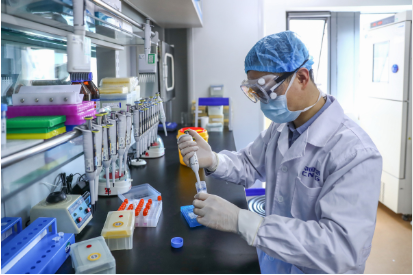转自China Daily :

A CNBG employee performs tests on the company's COVID-19 vaccines under development at a research institute in Wuhan, capital of Hubei province, on April 11.[Photo/Xinhua]
China has adopted five technological approaches to develop COVID-19 vaccines-inactivated vaccines, recombinant protein vaccines, adenovirus vector vaccines, nucleic acid vaccines and vaccines using attenuated influenza viruses as vectors.
The country has now approved one recombinant adenovirus vector vaccine and three inactivated vaccines for clinical trials, while the quest for vaccines using other technical routes is also advancing rapidly.
Apart from Sinopharm's two inactivated vaccine candidates, an inactivated vaccine developed by Beijing-based Sinovac Research and Development Co Ltd was approved on April 13 for clinical trials.
The recombinant adenovirus vector-based vaccine candidate, developed by the Academy of Military Medical Sciences of the People's Liberation Army and Chinese firm CanSino Bio, officially entered phase-2 human trials on April 12 and became the world's first COVID-19 vaccine candidate to reach this stage of trials, said the World Health Organization.
Despite there being no accurate statistics on the exact number of COVID-19 vaccine programs worldwide, the WHO said earlier this month that there were currently 70 vaccine candidates in development.
Sinopharm, officially known as China National Pharmaceutical Group Co Ltd, China's largest pharmaceutical company with more than 1,500 subsidiaries, including six publicly listed entities, is developing vaccines using two different technological approaches: inactivated and recombinant protein vaccines.
According to a recent report by SinoLink Securities, developing inactivated vaccines usually takes more time compared with newer technologies of nucleic acid and recombinant vaccines because the traditional method has strict R&D conditions including high biosafety standards.
But once successfully synthesized, inactivated vaccines can be massively produced while it is often difficult to produce vaccines using new technologies on a large scale due to a lack of production capacity, the report said.
Liu Jingzhen, chairman of Sinopharm, said the company has set aside a fund of 1 billion yuan ($141.33 million) to support the vaccines' R&D.
CNBG's April 12 randomized, double-blind, placebo parallel-controlled human trials took place in Jiaozuo, Henan province.
The design of the clinical studies is in full accordance with the requirements of national norms, including gradually increasing inoculation dosages and starting with middle-aged groups, said Sinopharm.
As of Thursday, a total of 96 people in three age groups aged between 18 and 60 had been inoculated, and all were reported to be in good condition, the company said, adding that participants will continue to be under close observation to assess the vaccine's safety.
The phase-2 study aims at not only testing the vaccine's safety, but also figuring out vaccination procedures, including how many doses and how much of each are required.
The vaccine will also go through the third phase of clinical trials, which will mainly test efficacy and safety, said the company.
It may take more than a year to finish all three phases of human trials to determine whether the vaccine is safe and effective in protecting people from COVID-19, the company said.




